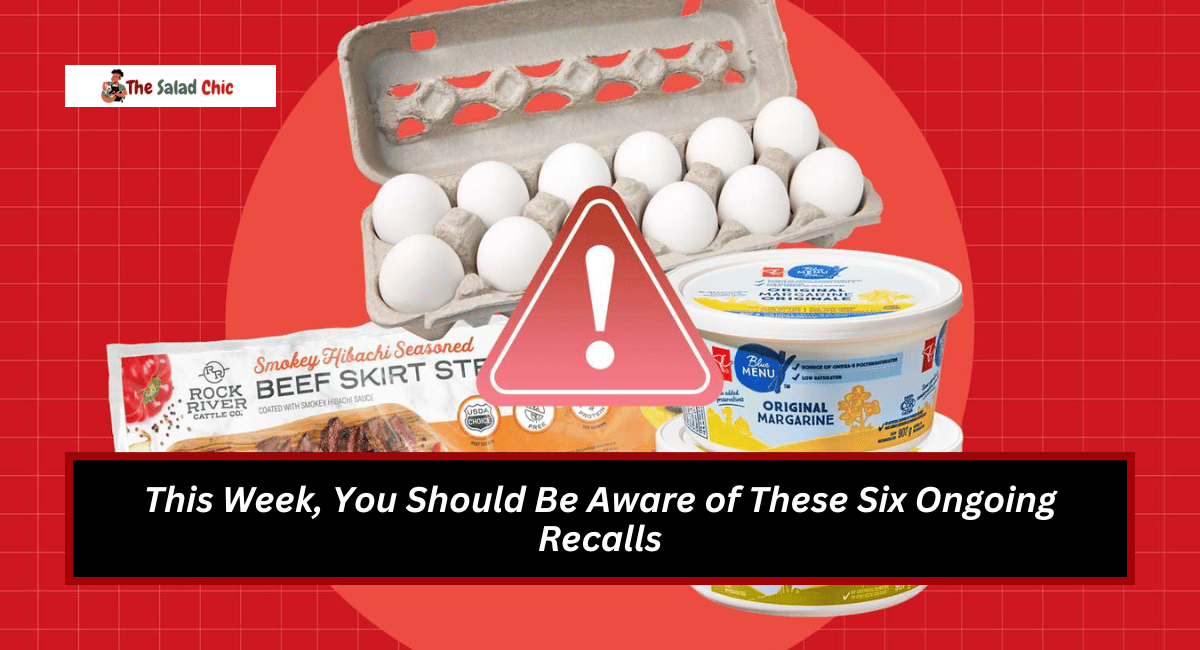Food safety is critical, particularly during the holiday season when feasts and get-togethers occur daily. Certain products on our shelves may be dangerous for our health because of contamination or incorrect labeling.
A number of popular products, such as ground beef, baked goods, salad toppings, and carrots, have been recalled this week. Here are some tips for safeguarding your pantry and preventing any danger to your family.
Fresh Gourmet Tortilla Strips from Sugar Foods
Fresh Gourmet Tortilla Strips Santa Fe Style are recalled by the U.S. Food & Drug Administration (FDA) because of unreported wheat. Due to a packing error, bags that were supposed to be tortilla strips were filled with wheat-containing crispy onions. This is dangerous for anyone with a wheat allergy or sensitivity since it can cause severe allergic responses.
What You Must Do
If the product you bought has a “Best By” date of June 20, 2025, verify the UPC on the package. Impacted items should be thrown out immediately or returned to the shop. Although no recorded illnesses exist, customers are advised to exercise caution.
Yu Shang Food Products: Beef, Pork, and Chicken
Because of a link to a Listeria infection, Yu Shang Food has recalled more than 72,000 pounds of ready-to-eat pork products. Listeria is a dangerous bacteria that can lead to severe disease, particularly in older persons, pregnant women, and those with compromised immune systems.
Specifics of the Recall
Pork, beef, and poultry goods made before October 28, 2024, are included in the recall. The USDA inspection label for these products has the establishment number P-46684 or EST. M46684.
How to Keep Yourself Safe
Return these items to the store where you bought them or dispose of them immediately. Acting quickly is crucial since listeria outbreaks have caused sickness and fatalities in four states.
Excellent Value Cheese Danishes with Cinnamon Rolls
There is a recall of baked products sold under Walmart’s Great Value brand because they may contain plastic shards. This includes The J.M. Smucker Company’s Cheese Danishes and Cinnamon Rolls.
What’s Influenced
Check the box for exact lot numbers. To reduce the chance of ingesting a foreign object, return any things you have bought to Walmart for a refund or dispose of them properly.
Organic Carrots from Grimmway Farms
After reports of E. coli illnesses connected to eating organic carrots from Grimmway Farms, a nationwide recall has been issued. The recall has already caused numerous diseases, hospitalizations, and even one fatality.
Affected Stores
Trader Joe’s, Walmart, Whole Foods, Costco, Kroger, Publix, and Aldi were among the significant stores that sold tainted carrots between August 14 and October 23. These items came in mixed vegetable bundles, baby carrots, and whole carrots.
How to Proceed
If you think you may still have these carrots, throw them out right away. To avoid cross-contamination, clean any surfaces the carrots may have come into contact with.
Kickin’ Carrot Falafel Bites That Are Fabalish
Because of the possibility of contamination from the same carrots used in the Grimmway Farms recalls, Fabalish, a New Jersey business, has voluntarily recalled its Kickin’ Carrot Falafel Bites. The company is being cautious even though no illnesses have been recorded.
Things to Verify
The impacted product’s packaging flap displays lot code 260925. If you have already bought these falafel snacks, throw them away and get a refund from the company.
Ground Beef Wolverine Packing Co.
Due to a potential E. coli infection, Wolverine Packing Co. is recalling more than 167,000 pounds of ground beef, both fresh and frozen, distributed to restaurants across the country.
What You Must Understand
The tainted ground beef was manufactured on October 22, 2024, and has the establishment number EST. 2574B. The recall was prompted by reports of E. coli infections from Minnesotans who ate the meat.
Suggested Course of Action
The USDA encourages restaurants and customers to inspect their freezers for impacted items. Any possibly tainted meat should be thrown out or returned to the supplier.
Conclusion
Food recalls are an essential reminder of the value of being watchful about food safety. These recalls carry genuine hazards, whether dangerous pathogens, extraneous items, or unreported allergies cause them.
You can protect your home from possible health risks by being aware and implementing the necessary safety measures. Do not hesitate to return or dispose of any items listed for a refund. When in doubt, put safety above money.
FAQs
What should I do if I’ve eaten anything that has been recalled?
After ingesting a recalled product, get medical help immediately if you suffer from symptoms, including allergic reactions, stomach pain, or other illness-related indicators. To avoid further hazards, throw away the merchandise even if you feel great.
How can I determine whether a product I purchased is recalled?
Look for UPCs, lot numbers, or establishment numbers included in the recall statement on the product’s packaging. If in doubt, seek clarification from the retailer where you bought the item or visit the manufacturer’s website.
How often do food recalls occur?
Food recalls do occur often. They play a crucial role in upholding food safety regulations and shielding customers from health hazards.
If a product is recalled, can I obtain a refund?
Yes, generally speaking. Producers and retailers usually provide replacements or reimbursements for recalled goods. For further information, see the particular recall instructions.
How do I keep abreast of food recalls?
You can stay informed by routinely visiting websites such as the FDA and USDA recall pages or subscribing to their email notifications. Local news sources also report major recalls.

